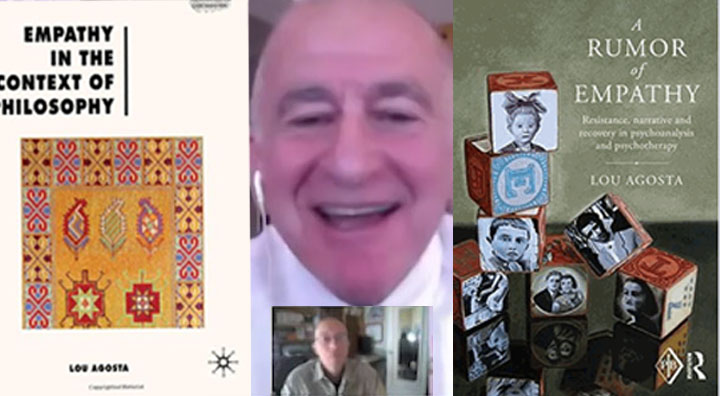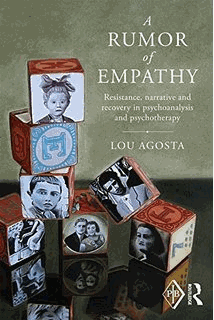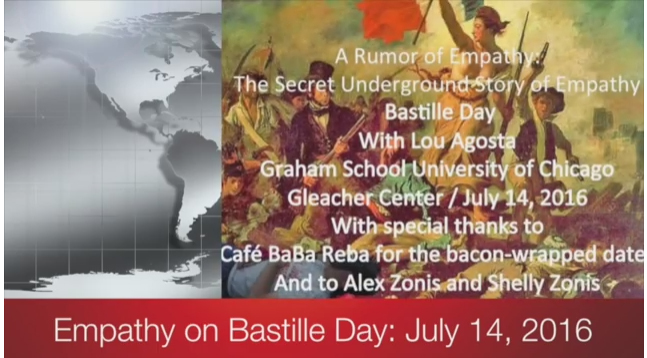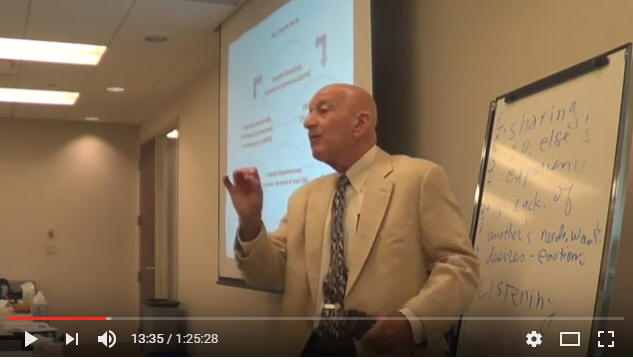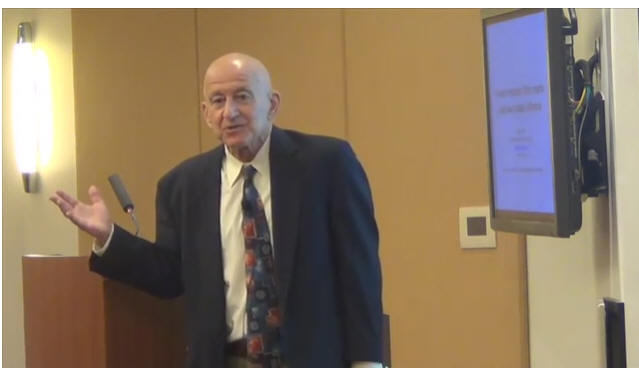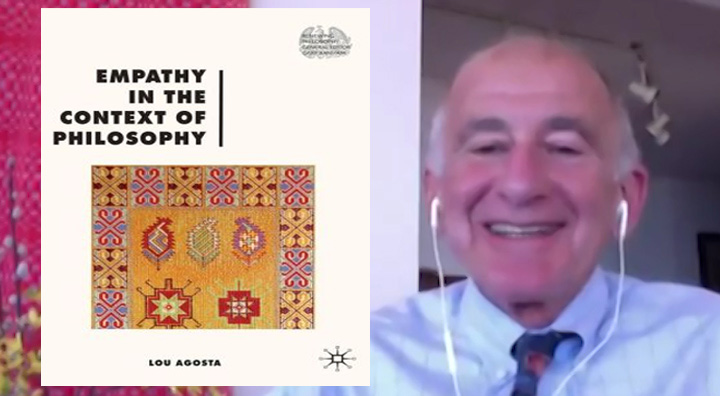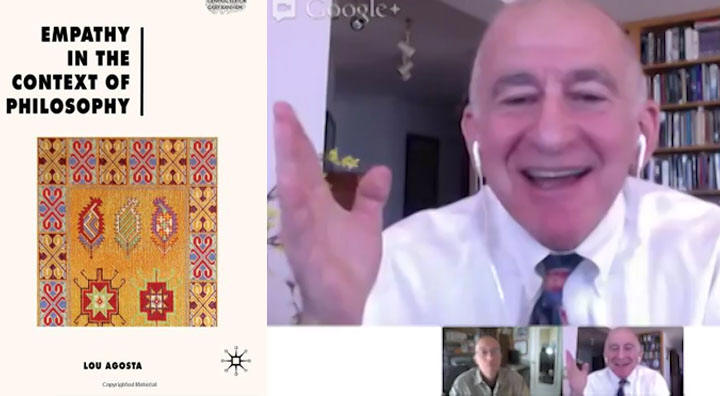|
|
|
Culture of Empathy Builder:
Lou Agosta
Lou
Agosta and Edwin Rutsch: Dialogs on How to Build a
Culture of Empathy Lou Agosta is on the faculty of the Illinois School of Professional Psychology.
He practices psychotherapy in the Chicago. His area of concentration
includes the dynamic containing and transforming of domestic violence and
intimate partner abuse. Lou is author of
Empathy in the Context of Philosophy
which is an exploration of the deep structure of empathy as a fundamentally
human capability for creating possibilities of community and human
relations. He also writes extensively about the
nature of empathy on his website
ListeningWithEmpathy.com.
Links
Lou Agosta
& Edwin Rutsch: How to Build a Culture of Empathy (Video
Transcriptions: If you would like to take empathic action
and create a transcription of this video, check
the volunteers page. The transcriptions will make it easier for
other viewers to quickly see the content of this video.)
Lou Agosta & Edwin Rutsch discuss Lou's recent article. 'Compassion
Fatigue: A radical proposal for overcoming it.' We talk about
the confusion, inaccuracies, myths and misunderstandings about the
concepts and experiences of:
* Empathy,
The good news is that empathy serves as an antidote
to burnout or "compassion fatigue." Note the language here.
Unregulated empathy results in "compassion fatigue." However, empathy
lessons repeatedly distinguish empathy from compassion.
Most providers of empathy find that with a modest amount of training,
they can adjust their empathic receptivity up or down to maintain
their own emotional equilibrium. In the face of a series of sequential
samples of suffering, the empathic person is able to maintain his
emotional equilibrium thanks to a properly adjusted empathic
receptivity. No one is saying that the other's suffering or pain
should be minimized in any way or invalidated. One is saying that,
with practice, regulating empathy becomes a best practice.
Introduction: Rewriting the Definition of Empathy
"The deep, underground history of empathy is surfaced and
reconstructed in Hume, Kant, Lipps, Freud, Scheler, Stein, and Husserl.
A Rumor of Empathy is engaged in vicarious feeling, receptivity,
empathic understanding, empathic interpretation, and empathic
intersubjectivity.
A rumor of empathy becomes a scandal of empathy in
Lipps' projections and Strachey's mistranslations. Empathy is
reconstructed in Hume's many meanings of "sympathy"; in Kant on "the
communicability of feelings" and "enlarged thinking" of the other; in
Freud's introspection and free association; in Scheler's "vicarious
experience" and perception of The Other; in Stein's sensual empathy; and
in Husserl's late writing on empathic windows of consciousness accessing
other persons as Husserl's empathy moves from the periphery to the
foundation of community.
Yet when all the philosophical arguments and categories
are complete, the phenomenological methods reduced, and hermeneutic
circles spun out, in empathy, we are quite simply in the presence of
another human being."
Empathy, Capitalist Tool: Lou Agosta interviewed by Brandon Hamilton about business and empathy
Video: The Secret Underground History of Empathy: UChicago Graham School Bastille Day Talk by Lou Agosta
"A famous person once said: "Empathy is oxygen for the soul." So if one is feeling shortness of breath, maybe one needs expanded empathy! This course will connect the dots between empathy and neuroscience ("brain science"). For example, empathic responsiveness releases the compassion hormone oxytocin, which blocks the stress hormone cortisol. Reduced stress correlates to reduced risk of such life style disorders as cardiovascular disease, diabetes, weak immune system, depression, and the common cold."
Empathy And Literature At Rush Oct13 2016
Video: Empathy:
Your Unfair Competitive Advantage in Career Transition: Complete Session Video: Empathy: Your Unfair Competitive Advantage in Career Transition, Part 2
Empathy What it is and how it
works Northwestern Feinberg School
How is empathy different than compassion or altruism?
Video: Empathy on
Bastille Day: University of Chicago Graham School on Bastille Day 2016
[excerpts]. Online Talk Radio - Lou Agosta, Ph.D., -Empathy in Context and A Short History of Empathy "Lou Agosta, Ph.D., specializes in a gracious and generous listening based on empathy. As an educator, he teaches empathy in the history and systems of psychology program at the Illinois School of Professional Psychology at Argosy University and he is a psychotherapist in private practice in Chicago."
A Rumor of Empathy…in Psychology (the movie) "This educational video explores empathy in the listening and speaking of the community of psychologists, psychotherapists, and those committed to emotional and human well-being. That about covers it. Where is empathy present and where is it missing? Should one expect the therapist to cry with you if the trauma is really, really sad? What if she or he does cry anyway? How does this relate to music therapy? Neurology? Alcoholics Anonymous (AA)? How does empathy relate to the “circle of caring”? All these questions and more are engaged. Not to be missed!"
2013-07-11- Response to Paul Bloom &
New Yorker's Anti-Empathy Article: Lou Agosta & Edwin Rutsch
Lou Agusta:
A Rumor of Empathy Interview with David Howe
Lou Agosta Talks
About Empathy With Arnon Rolnick on March 9, 2014
|
|||||||||||||||||
|
||||






